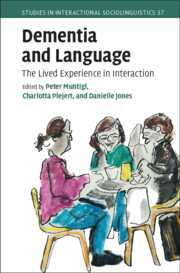Book contents
- Dementia and Language
- Studies in Interactional Sociolinguistics
- Dementia and Language
- Copyright page
- Contents
- Figures
- Tables
- Contributors
- Transcript notation key
- Part 1 Introduction
- Part 2 Dementia and Diagnostics
- 2 Good Reasons for Non-standardization in the Administration of Cognitive Assessments
- 3 (Mis)alignment at Dementia Diagnosis
- 4 The Role of Applied Conversation Analysis to Enhance Equity in Care for People with Dementia from Minority Ethnic Groups
- Part 3 Dementia and Conversational Strategies
- Part 4 Dementia and Epistemics
- Part 5 Communicative Challenges in Everyday Social Life
- Index
- References
3 - (Mis)alignment at Dementia Diagnosis
A Window into Differing Expectations, Perceptions and Agendas in the Memory Clinic
from Part 2 - Dementia and Diagnostics
Published online by Cambridge University Press: 21 November 2024
- Dementia and Language
- Studies in Interactional Sociolinguistics
- Dementia and Language
- Copyright page
- Contents
- Figures
- Tables
- Contributors
- Transcript notation key
- Part 1 Introduction
- Part 2 Dementia and Diagnostics
- 2 Good Reasons for Non-standardization in the Administration of Cognitive Assessments
- 3 (Mis)alignment at Dementia Diagnosis
- 4 The Role of Applied Conversation Analysis to Enhance Equity in Care for People with Dementia from Minority Ethnic Groups
- Part 3 Dementia and Conversational Strategies
- Part 4 Dementia and Epistemics
- Part 5 Communicative Challenges in Everyday Social Life
- Index
- References
Summary
This chapter explores how differing expectations and experiences manifest in diagnostic interactions in the memory clinic. We do this by microanalysing communication in dementia diagnosis feedback meetings, focusing on instances of misalignment between doctors and the person living with dementia. We examine three videos from a dataset of 101 recordings from two areas in the UK, collected as part of the ShareD study. We present different interactional contexts where the person receiving a dementia diagnosis choose to align or misalign with the doctors’ interactional projects of diagnosis delivery, prescribing medication and recommending support. Examination of these instances suggests that misalignment between the assessment of symptoms may, at least in part, reflect interactional facework in the face of dementia as a challenge to self-identity.
- Type
- Chapter
- Information
- Dementia and LanguageThe Lived Experience in Interaction, pp. 50 - 72Publisher: Cambridge University PressPrint publication year: 2024

